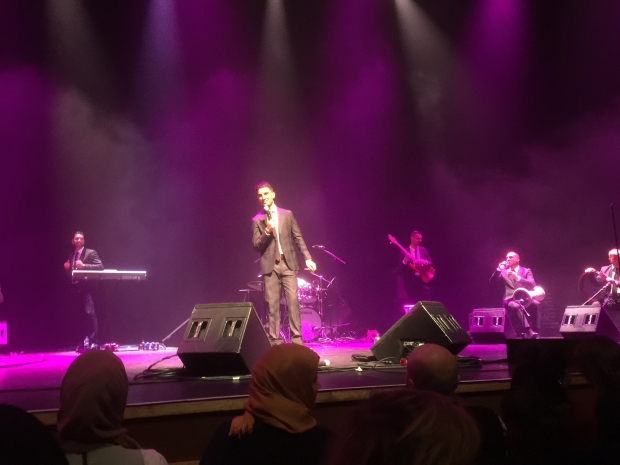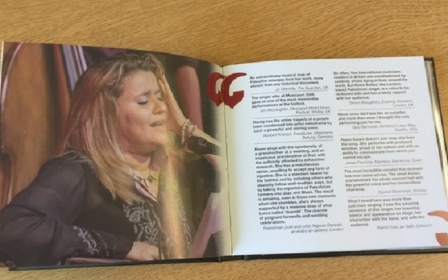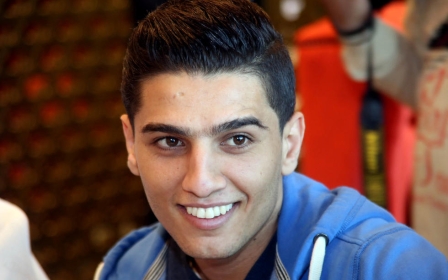Palestine's Arab Idol Mohammed Assaf rocks London

The rise to fame of Palestinian singer Mohammed Assaf, the 2014 winner of the hugely popular MBC show Arab Idol, is a remarkable journey that brought him from Gaza's Khan Younis refugee camp to London's Barbican, where he caused a sensation this month.
Assaf was born in Libya but raised in Gaza’s Khan Younis refugee camp. His musical talent lay undiscovered save for singing at weddings and an appearance on a Palestinian talent show. This was until he was encouraged by his mother to compete for Arab Idol. The auditions in Egypt were easy to reach for most Arab competitors but not for a Palestinian from Gaza. It took him two days to reach the venue only to find that it was too late - or so he thought.
When he telephoned his mother to explain his predicament, she insisted that he contact the organisers even if he had to jump over the venue’s wall. He finally decided to heed his mother’s advice – or rather her order - and jumped over the wall, only to find that all the available places had been allocated. He would not take no for an answer and started singing. He was luckily recognised by another Palestinian who had been allocated a place and graciously gave it to him because he thought he would have a better chance of winning. He recognised him from his now legendary song Wave the Kufiyya.
Assaf sailed through the auditions with one of the judges, famous Lebanese singer Ragheb Alamah, telling him that he was one of the contestants he would remember. Assaf went on to wow the crowds in round after round with a mixture of traditional Palestinian songs but also classics, particularly by Egyptian icon Abdulhalim Hafez, whose looks some thought he shared. Alamah described him as Sarukh, or rocket, referring to his incredible projectile rise.
Assaf’s win brought the Palestinian people joy, pride and some relief from the occupation. It also brought him instant fame, a recording contract and the title of ambassador of culture and arts by the Palestinian government with "diplomatic standing". Assaf, who had studied in a school run by UNRWA, saw the organisation name him the first UNRWA regional youth ambassador for Palestine Refugees.
Shortly after his win Assaf sang at the UN and the opening ceremony of the FIFA congress which preceded the 2014 World up in Brazil. (FIFA never provided an adequate explanation as to why this was switched from singing at the actual World Cup opening ceremony to the congress.)
Since his win, Assaf has built on his success when many winners of other such competitions disappear from the limelight following their triumph. He launched an album with Platinum records and a number of singles and videos. His most successful song and video since his win is probably Ya Halali w ya Mali which he recorded in a Palestinian refugee camp in Lebanon.
He has also performed for his fans at numerous concerts around the world but also in his beloved Palestine. The difficulty of navigating his way out of Gaza as regularly as he needs due to the ongoing siege meant that he had to move first to Ramallah in the West Bank and now spending more time in Dubai to ensure he can meet his commitments, the most recent of which was at the Barbican.
Assaf’s concert at the Barbican was hugely popular with most tickets being snapped up soon after they went on sale. The crowd was very diverse, some who knew what was coming but others, mainly westerners, coming to experience this Arab Palestinian singer and his music for the first time. They were not disappointed. He brought the house down. He sang a range of songs from traditional Palestinian favourites to some from his own album but also classics by Egyptian legend Abdulhalim Hafez and Lebanese giant Wadi Alsafi. He was careful to ensure he pleased not only his sizeable Palestinian audience but also those from across the Arab world. They sang with him but were also moved to perform the traditional Palestinian dance, the dabka. Lines of dancers formed among across the isles as Assaf also danced the dabka on stage.
Assaf sang for almost two and a half hours, not only wowing the audience but also being complemented by the Barbican’s management according to Palestinian website Watan TV. They report that the Barbican had never seen such a reaction from an audience to a performer. They also expressed their surprise at what they said was a non-Arabic speaking audience dancing in the isles to the Palestinian dabka. British friends of mine who attended the concert were exhilarated from start to end, with one expressing her disappointment that he did not come back for an encore. I explained that encores are uncommon in the Middle East.
Assaf and Reem Kelani, whose new album I recently reviewed, are cultural ambassadors for Palestine, playing a vital role in presenting this culture not only to be enjoyed by audiences but to humanise Palestinians to counter Israel’s attempt to dehumanise them.
Palestinians are proud of their culture and can point to food, poetry, music, embroidery and dance as a few examples of what defines Palestinians as a people. Their struggle with Israel for freedom and the attainment of their rights has also included a struggle to stop Israel’s attempts at claiming elements of Palestinian culture as Israeli culture, be this humus, falafel or embroidery. The battle for cultural identity is therefore an important aspect of Palestinian resistance. For this battle to be won there is a need for a concerted effort to send more ambassadors forth to spread the message. This requires funding, support and talent, which in the person of Assaf but also many others, Palestinians demonstrably have in buckets.
New MEE newsletter: Jerusalem Dispatch
Sign up to get the latest insights and analysis on Israel-Palestine, alongside Turkey Unpacked and other MEE newsletters
Middle East Eye delivers independent and unrivalled coverage and analysis of the Middle East, North Africa and beyond. To learn more about republishing this content and the associated fees, please fill out this form. More about MEE can be found here.





